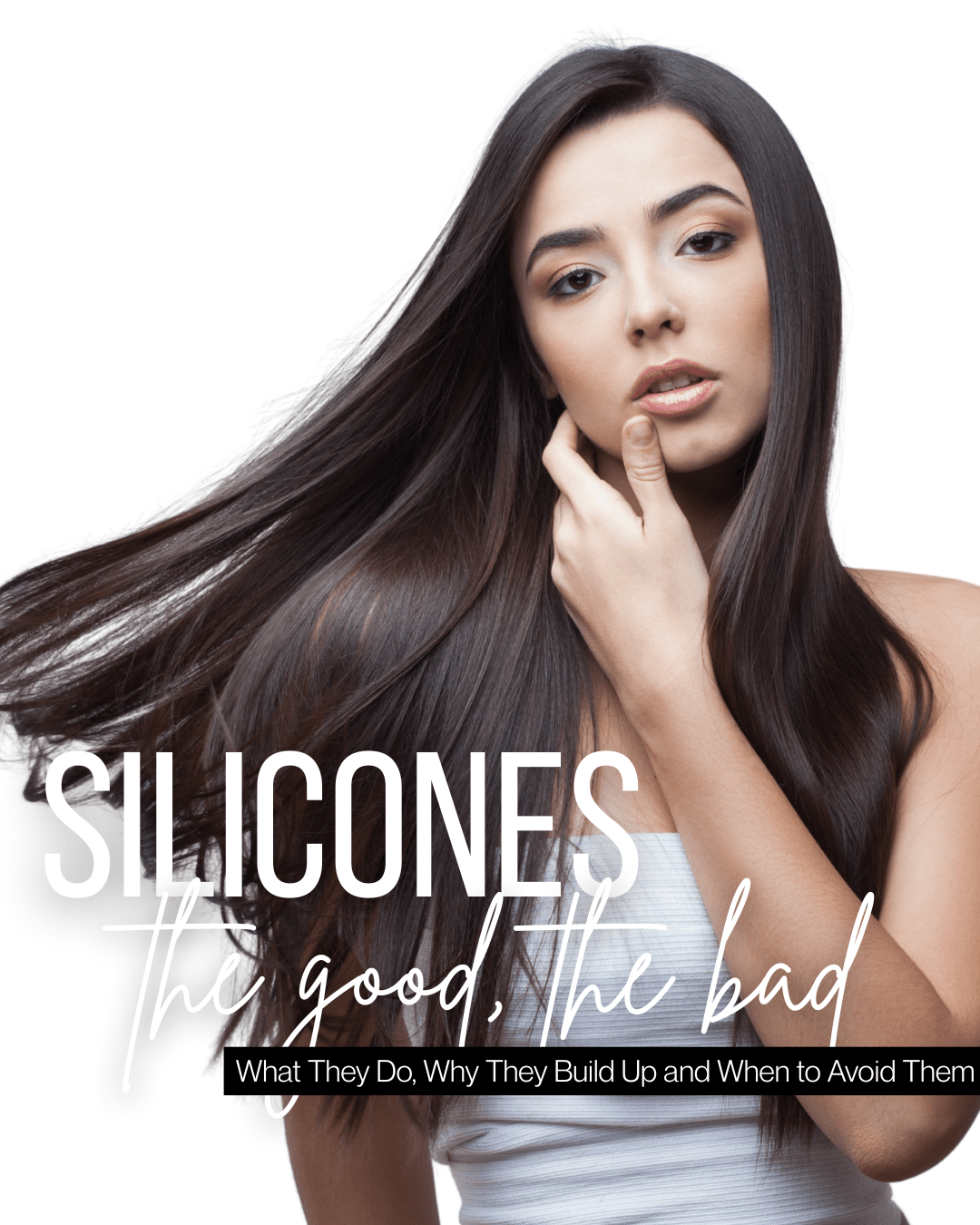August 07, 2025

As hair care enthusiasts, we're always on the hunt for products that can transform our locks, leaving them silky smooth, frizz-free and full of shine. One ingredient that often takes center stage in achieving these results is silicone. But what exactly are silicones, and how do they impact our hair? In this comprehensive blog post, we'll dive deep into the world of silicones, exploring their benefits, potential drawbacks, and when it might be best to steer clear.
Silicones are a broad category of synthetic compounds that are widely used in the beauty and personal care industry. In the context of hair care, silicones are prized for their ability to provide a range of desirable effects, from smoothing the hair cuticle to adding shine and protecting against heat damage.
At their core, silicones are made up of silicon, oxygen, and various organic groups. They come in a variety of molecular structures, each with its own unique properties and characteristics. Some silicones are water-soluble, meaning they can be easily rinsed out of the hair, while others are non-water-soluble, leading to a potential for buildup over time.
Silicones are beloved in the hair care world for good reason. When used judiciously, they can provide a range of benefits that can transform the look and feel of our tresses.
One of the primary functions of silicones is to smooth down the hair cuticle, the outermost layer of the hair strand. By creating a protective, slippery barrier on the surface of the hair, silicones can help reduce frizz and flyaways, leaving the hair feeling silky and manageable.
Silicones are renowned for their ability to enhance shine and luster in the hair. By reflecting light, they can create the illusion of healthier, more vibrant-looking locks.
The smoothing and protective properties of silicones can also help tame frizz, particularly in humid or damp environments. By sealing the cuticle and creating a barrier against moisture, silicones can help keep hair looking sleek and polished.
Many silicones are also effective at providing a thermal barrier, shielding the hair from the damaging effects of heat styling tools like blow dryers, curling irons, and straighteners. This can help prevent split ends and breakage, preserving the overall health of the hair.
While silicones offer a wealth of benefits, they can also come with some potential drawbacks, especially when used excessively or without proper care.
One of the most common issues associated with silicones is product buildup. Non-water-soluble silicones, in particular, can accumulate on the hair and scalp over time, leading to a heavy, greasy feeling and potentially clogging the pores.
The coating effect of silicones can also weigh down the hair, making it appear flat and lifeless, especially for those with fine or thin hair textures.
Silicones can potentially create a barrier that prevents the hair from absorbing moisture, which can be problematic for those with dry or damaged hair in need of deep hydration.
The way silicones interact with the hair can also vary depending on the individual's hair porosity. Those with low-porosity hair may find that silicones sit on the surface, leading to buildup and reduced moisture absorption.
Recognizing the signs of silicone buildup can help you identify when it's time to switch up your hair care routine. Some common indicators include:
While silicones can be a valuable addition to many hair care regimens, there are certain situations where it may be best to steer clear or use them with caution:
Individuals with fine, thin, or low-porosity hair may find that silicones weigh down their strands and contribute to product buildup more readily. In these cases, it may be better to opt for silicone-free formulas.
If you've recently undergone a chemical hair treatment, such as coloring, bleaching, or a perm, it's generally recommended to avoid silicones until the hair has had a chance to recover and rebuild its natural protective barrier.
Curly, coily, and highly textured hair types may also benefit from a silicone-free approach, as the coating effect can interfere with the hair's ability to absorb moisture and maintain its natural curl pattern.
If you're looking to reduce your reliance on silicones, there are plenty of natural and silicone-free alternatives to explore. Some options include:
These natural ingredients can provide many of the same benefits as silicones, such as smoothing, shine, and heat protection, without the potential for buildup.
Silicones are a complex and multifaceted ingredient in the world of hair care. While they offer a wealth of benefits, it's important to use them judiciously and be mindful of potential drawbacks, especially for specific hair types and needs. By understanding the role of silicones and when to incorporate or avoid them, you can create a personalized hair care routine that leaves your locks looking and feeling their absolute best. Happy styling!
September 28, 2025
As we step into the year 2025, the world of hair trends is undergoing a remarkable transformation. The beauty industry is abuzz with the emergence of captivating new hairstyles that are set to dominate the fashion landscape
September 04, 2025
Imagine waking up each morning with hair that is stronger, healthier, and more vibrant than ever before. With our Green Tea Rinse, you can unlock your hair's full potential and embark on a transformative journey towards the luscious, nourished locks of your dreams. Experience the difference that our botanical-infused formula can make and witness the remarkable results for yourself.
September 03, 2025
In the ever-evolving world of hair care, the quest for longer, stronger, and healthier locks is a constant pursuit. One popular solution that has gained significant attention in recent years is the use of scalp oils, particularly rosemary oil, to stimulate hair growth. But do these oils truly live up to the hype, or is it all just a myth?
| Item | Price | Qty | Total | |
|---|---|---|---|---|
| Subtotal |
$ 0.00 |
|||
| Shipping | ||||
| Total | ||||
Draft order has been created successfully.
Add address